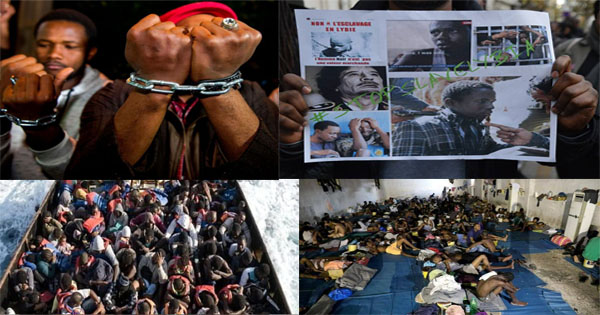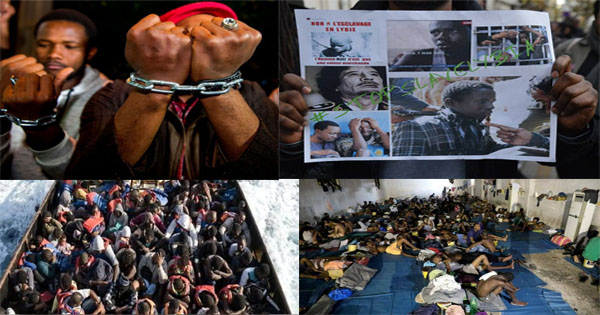Slavery in Libya. Repatriation, sanctions. What’s happening today?
Following a CNN video on a slave sale in Libya on Tuesday, November 14, 2017, public opinion was shaken. Thousands of people have come out on the streets of Paris and around the world to make their indignation heard. But what exactly happened?
What are the reasons for the migration?
In order to improve their living conditions, many migrants choose to take the perilous road of Libya to reach Europe through the central Mediterranean, hoping for a better life. It must be emphasized that since the night of time, migration has existed. Men leave this or that place to find a land more promising to their aspirations. Africa often faces difficulties. Lack of job opportunities, an unstable political climate, wars and poverty are driving these young migrants to leave everything. But is it a crime to dream? Is it a mistake to want a better life for oneself and members of one’s family? But going blind, is it really reasonable?
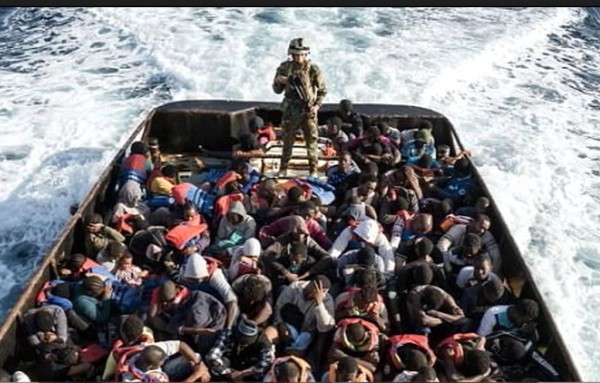 |
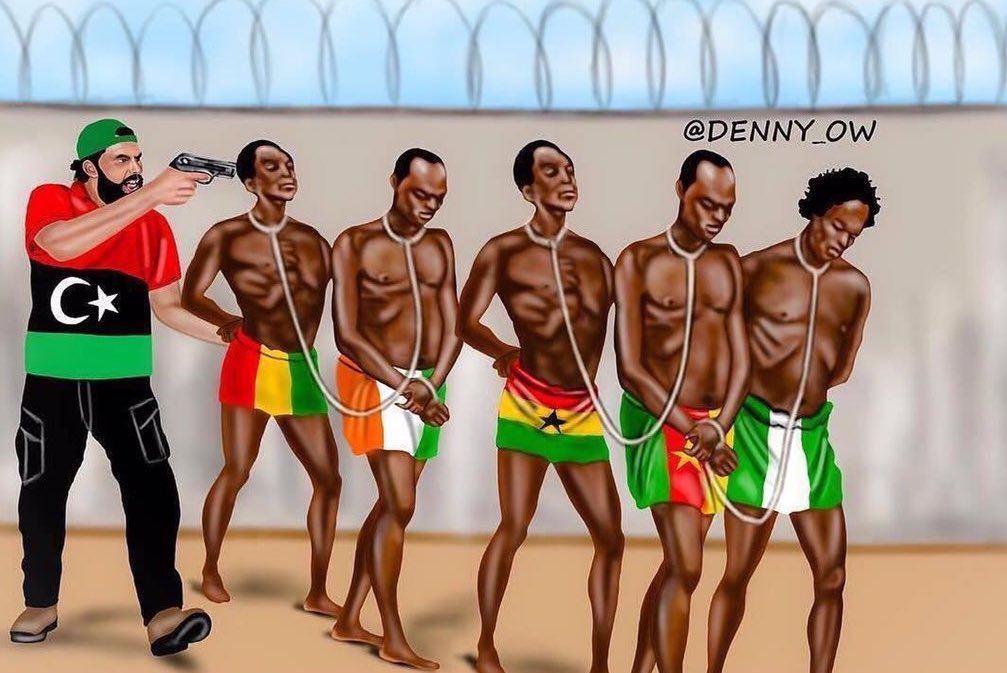 |
Libya, an unstable country since the death of Muammar Gaddafi.
Since the fall of Gaddafi, Libya has become an unstable country. Since 2011, she is in the grip of a civil war. Many armed groups are actually exercising power in the country against the Tripoli government, recognized by the international community. But that is still too weak today. When migrants cross this country, they are sequestered and taken hostage by traffickers who make them live a real hell. Thanks to an emergency meeting of the UN Security Council, it can be pointed out that there are more than 17,000 migrants and refugees in detention in Libya.
The Horror Of Video: a media shock wave.
Sudanese journalist Nima Elbagir, based in Nairobi, Kenya, shared on CNN an exclusive hidden camera video that shows modern slave traffic near Tripoli. To authenticate the facts of an amateur video she received, Nima went to Libya with her producer Raja Razek and photojournalist Alex Platt. Shocked, they attended an auction. In front of the journalists, a dozen people marched to be sold. As the price increases, 400, 500, 550, 600, 650. Finally, some men are sold 1200 Libyan dinars about 740 €. These “slave markets” would take place once or twice a month, according to CNN’s report.
Honestly, I do not know what to say, it’s probably the most incredible thing I’ve seen ».
They nicknamed them ‘the commodity’. “It ended very quickly, with a total of 12 Nigerians sold under our eyes.“, Nima Elbagir says.
[huge_it_video_player id=”49″]
As soon as it was released, the video was a shock of media shock. These images have circled the planet, provoking reactions of indignation. Thousands of people demonstrated in France, Africa and around the world in front of the Libyan embassies. They all shouted in heart:
No to slavery in Libya! Free our brothers, free our sisters ! »
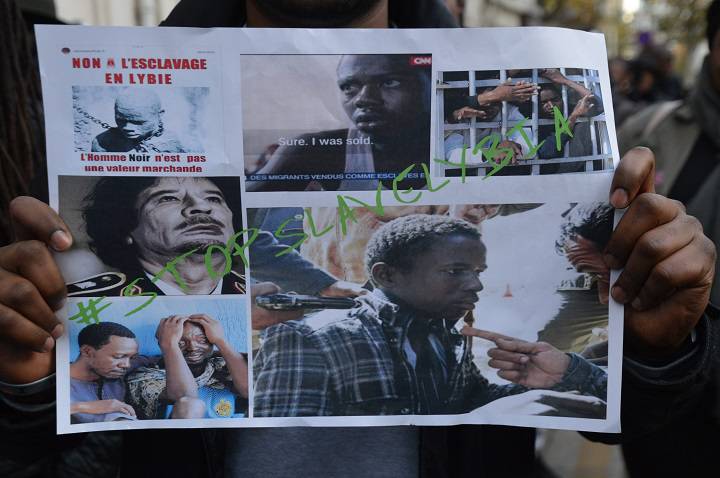 |
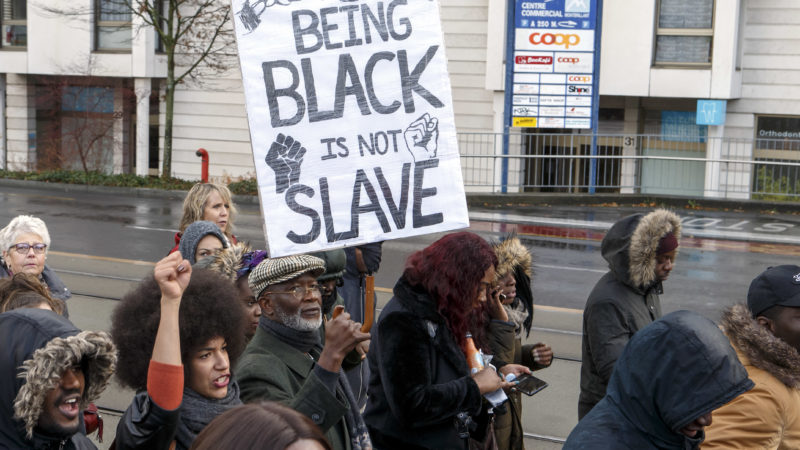 |
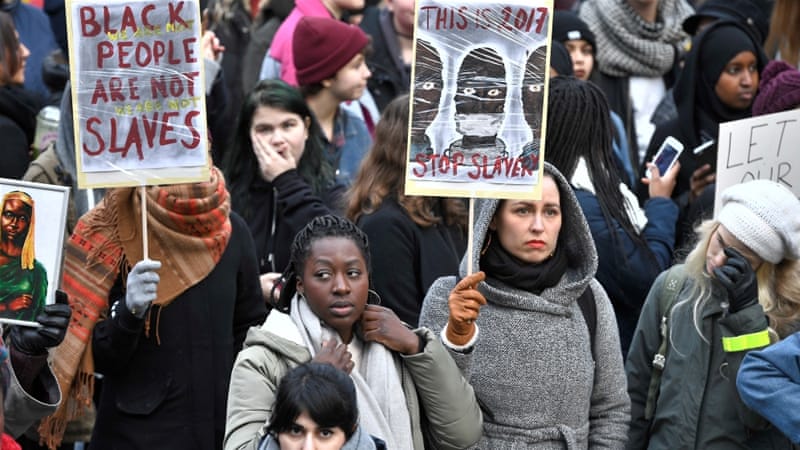 |
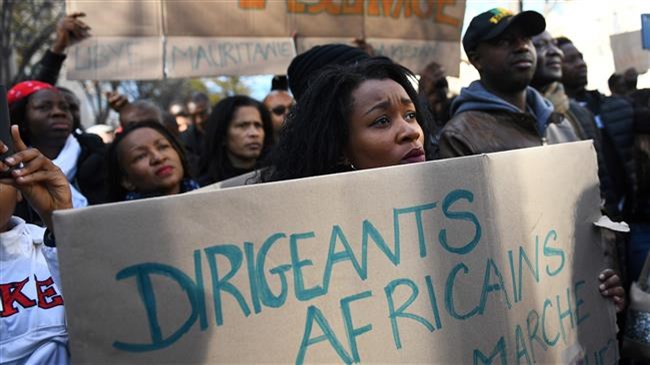 |
Personalities like the famous RFI host Claudy Siar, the Ivorian singer Alpha Blondy have expressed in video cries of anger at this unsustainable situation.

We, the African people who rely on you to defend and protect us, are surprised and amazed by your silence at the revolting, humiliating and unacceptable situation of your nationals, brothers, sisters, sons and daughters sold as slaves in Libya » expresses Alpha Blondy.
#MobilisationMondiale; Wherever you are in the world, 18 & 19November express your opposition to the crimes against humanity perpetrated by #Libye with the complicity of the # UE and the silence of the # Africa must free itself from all its torturers # Withoutviolencenorhate shares Claudy Siar, on his twitter account.
Activist Kemi Seba spoke with Claudy Siar to denounce his acts of barbarism during the demonstration Saturday 18 number in the streets of Paris. This event organized by the Collective Against Slavery and Liberation Camps in Libya (CECCL) was by far the one that mobilized the largest number of protesters. Many personalities and celebrities in France, Africa, the United States and have reacted on social networks to express their sorrows and their suffering.
Following this, African Union President Alpha Condé and UN Secretary-General Antonio Guterres are appalled by these appalling images.
These modern practices of slavery must stop and the African Union will use all the means at its disposal so that never again such ignominy is repeated » Alpha Condé
“Inhuman” situation for Migrants in Libya
Migrants are kidnapped, sequestered and racketed in Libya by traffickers. Thousands of men, women and children are piled on top of one another and locked in sheds like cattle. Deprived of all dignity, they suffer rape, torture, murder and various forms of slavery. Some are sold with impunity in some parts of the country.
In addition, some migrants are victims of organ trafficking. This scandal was revealed by the Daily Telegraph. A repentant human trafficker told an Italian official that refugees who can not pay their smugglers are sold to traffickers for their organs at 15,000 euros per head. According to a witness, the vast majority of organ traffickers are Egyptians, who resell the organs of migrants. Egypt, like Libya and Morocco, has also become a privileged starting point for Europe.
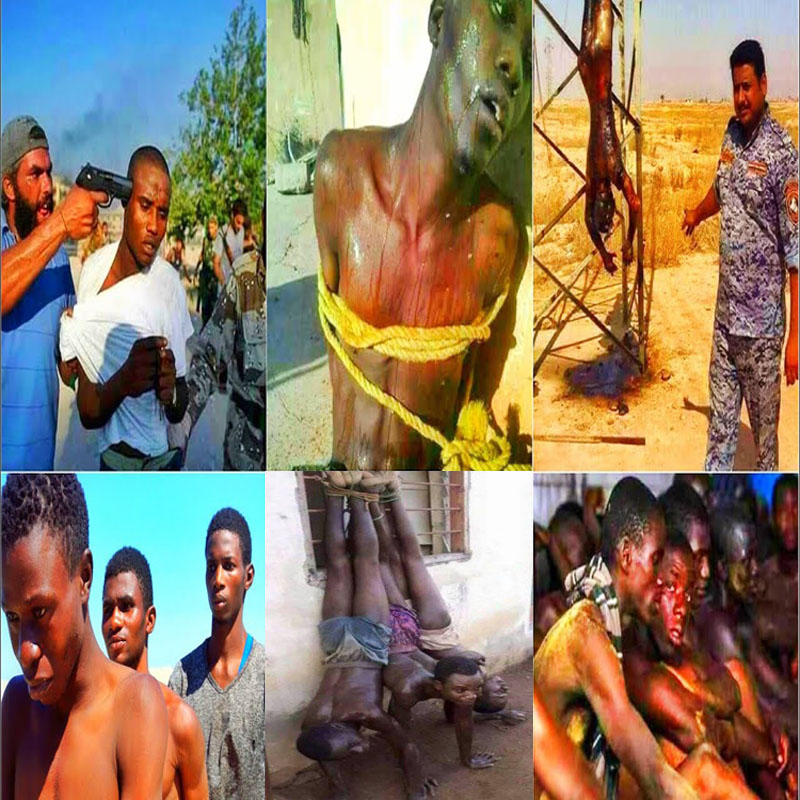
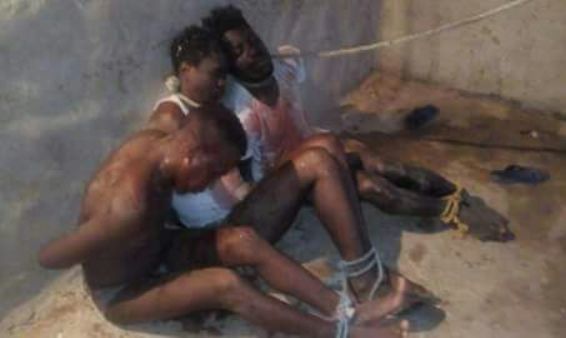 |
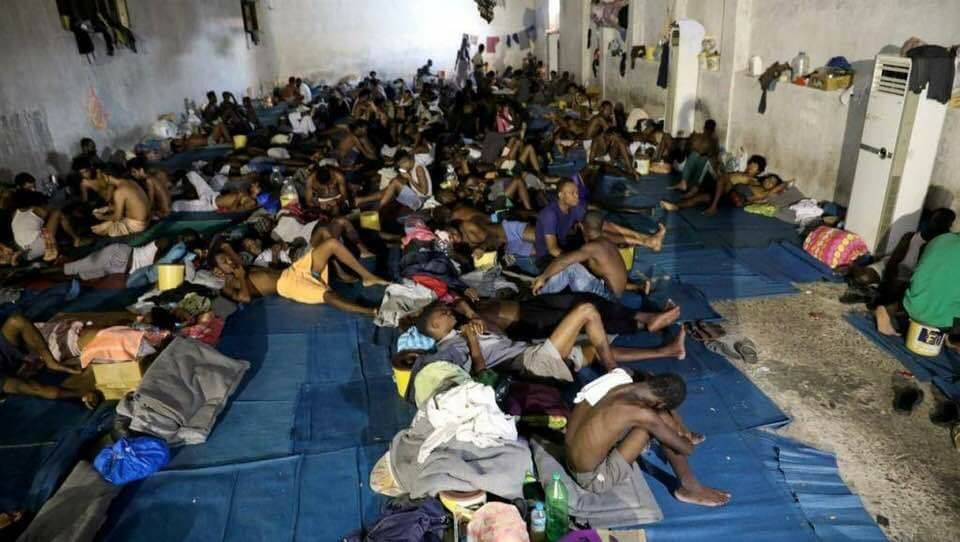 |
Even before this video, many organizations and associations had tried to alert International Authorities to this dramatic situation. But no one had reacted.
European organizations have arranged with the Libyan Coast Guard to block migrants in detention centers in Libya. But there are frightful and unacceptable things going on there. Migrants are tortured and beaten with electric cables. Mischievous people contact their families in Africa to extract money from them at the same time, they continue to mistreat them. When migrants can no longer give them money, some traffickers do not hesitate to sell them.
The international community can not continue to turn a blind eye to the unimaginable horrors endured by migrants in Libya, and claim that the situation can only be resolved by improving conditions of detention », says UN High Commissioner for Human Rights Zeid Ra’ad Al Hussein.
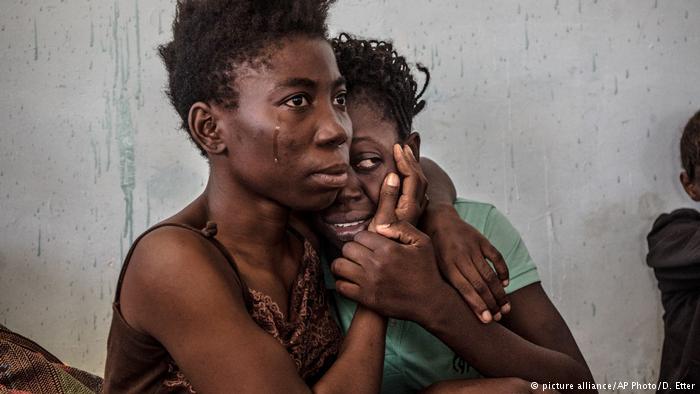
And today. What are the sanctions and actions of the authorities against slavery in Libya?

We all witnessed a wave of indignation at the images of modern slavery in Libya. But what happened after all these demonstrations? Have things changed?
I visit you in a context where the spirits are strongly marked by the sale, in Libyan territory, of migrants coming from sub-Saharan Africa. This trade of shame that awakens the demons of slavery is the worst form of violation of human rights, an offense to the universal conscience that should in no way go unpunished. »
The perpetrators and accomplices of these unspeakable acts must be brought to justice and their criminal networks dismantled »,said Macky Sall, President of Senegal.
Emmanuel Macron denounced in a speech to students in Ouagadougou “a crime against humanity”
I will also propose that Africa and Europe come to the aid of populations at risk in Libya, “added Emmanuel Macron. France will propose at the Abidjan summit a Euro-African initiative to evacuate “populations at risk” in Libya.
From a legal point of view, a survey has been opened by the African Commission on Human Rights. Libya has promised to cooperate. It must be remembered that since the fall of Gaddafi, Libya is controlled by armed groups. And the recognized Tripoli government is still too weak. It is a country in prey to anarchy, facing organized networks of traffickers. As a result, it is “impossible to identify and punish the perpetrators of the abuses“
What are the solutions proposed at the Europe-Africa Summit?
At the Europe-Africa Summit, three objectives were set.
- 1 / To dismantle trafficking networks with the establishment of an operational task force (“intervention force”) involving police and intelligence services. This intervention will take the form of a pre-existing international operation.
- 2 / Repatriate all the migrants from Libya in the face of anarchy that is happening in Libya. They will set up emergency evacuation operations.
“Emergency evacuation operations” of migrant victims of human traffickers in Libya will take place “in the coming days or weeks,” French President Emmanuel Macron of Abidjan (Ivory Coast) said.
For the AU Commission president, African migrants stranded in Libya must be repatriated, but voluntarily.
I appeal to all member states of the African Union, the African private sector and African citizens to make financial contributions to help alleviate the suffering of African migrants in Libya. he still declared. I urge the member states that have logistical means to make them available to facilitate the evacuation of Libya from African migrants who wish ».
The goal of the African Union is to bring back 15,000 to 20,000 migrants. Migrants must give their consent to be repatriated.
It is a voluntary return that depends on the will of migrants. They have the right to leave or stay in Libya (…) IOM estimates that 30% of these 700,000 migrants want to return to their country of origin voluntarily the majority prefer to stay and work in Libya. 30% of clandestine migrants want to join Europe. Of course, these statistics are estimates made from the information we were able to collect. It is possible that they are not 100% accurate. But those who are in detention centers mostly want to join Europe because they think they will have a better life there. For these migrants, we are working with UNHCR to determine if they are refugees who have reasons to not want to return to their country of origin. We see with UNHCR if it is possible to resettle them in other African countries. We are also working with our European partners to relocate a number of them in Europe. »
The repatriation process will be long, as 400,000 to 700,000 African migrants are spoken in Libya, said Moussa Faki Mahamat.
- 3/ Establishment of a commission of inquiry of the African Union to propose to the States of the tracks of communication aimed at the youth to discourage the volunteers at the beginning.
Some figures on the countries that repatriated their nationals to Libya.
Two months after the EU-AU summit in Abidjan, the Sudanese Commissioner for Social Affairs, Sudanese Amira el-Fadil, gave an update on repatriations.
In 2017, a program of the International Organization for Migration (IOM) allowed the voluntary return of nearly 20,000 African migrants to their countries of origin, according to the organization’s statistics.
- According to Amira el-Fadil, there were 12,708 people who returned to their country. But there is still a lot of work, as there are more than 200,000 illegal migrants in Libya.
- The Ivorian government regularly repatriates migrants in difficulty. In total, just over 1,566 Ivorian migrants benefited from return flights, in ten months, between May 2017 and February 2018. Thanks to collaboration between the Ivorian government and the International Organization for Migration (IOM), they were able to bring back men, pregnant women and unaccompanied children. There are still 7,503 people in distress identified waiting to be repatriated. To fight against departure towards the unknown, the Ivorian government has decided to intensify a public awareness campaign against irregular migration.
- On Tuesday February 13, 2018, 157 Guinean migrants were repatriated from Libya. Among them, there were vulnerable cases like, 6 children including 2 babies, 4 unaccompanied minors, 13 women.
- More than 915 Cameroonian clandestine migrants have been repatriated from Libya, Morocco, Mauritania and Niger. There were men, pregnant women and children. This return is organized within the framework of the project of the International Organization of Migration (IOM)
- 2,500 Senegalese migrants have agreed to return to Senegal. Some smugglers are arrested by the police. According to information from Libération, the accomplice of the alleged smuggler of Senegalese in Libya fell. It is Amsatou Dieng, manager of a transfer company Wari who operated with Adama Mbaye. He was arrested on the premises of Tfm. He is accused of criminal conspiracy because he was transporting young people to Libya, and once he was there he demanded large sums of money from their families, and nearly 12 million FCFA passed from his Wari point.
- With more than 1,300 Nigerians repatriated in November, against only 643 between December and March. Nigerian authorities claim that 5,000 people are still “stranded”. Nigeria, with its 190 million inhabitants, is the first country of illegal emigration in West Africa. He was regularly blamed by the European Union for refusing to repatriate his nationals, but partnership agreements were negotiated to facilitate their return.
Nigeria’s Minister of Foreign Affairs Geoffrey Onyeama returns from a detention center to speed up the pace:
“Our president has made available all the necessary resources to repatriate all Nigerians to the country. We are talking about 5,500 Nigerians, but this question of numbers has become problematic because it is difficult to get precise figures: some are under the control of the central government in the camps, others are clearly outside the camps. , others are also in less accessible areas and without control of the authorities.”
- Morocco has proposed planes to immediately repatriate at least 3,800 migrants. It thus supports the response of the international community. In parallel, the Moroccan government set up an operation to repatriate 338 Moroccan migrants. In August and December, the two previous operations had brought back 435 Moroccans held in Zouara, in northwestern Libya.
- Niger and Rwanda also offered asylum to those who could not return to their own country. “Given Rwanda’s political philosophy and our own history, we can not remain silent when human beings are mistreated and auctioned off like cattle,” said Rwandan Foreign Minister Louise Mushikiwabo. Rwanda can accommodate 30,000 African migrants.
The only way to stop human trafficking in Libya is to “reset” the peace process, to establish a government that is respected by all sides of the conflict, “says International Crisis Group.
Despite all these warnings about slavery in Libya, careless migrants continue the route of crossing to Europe through Libya to ride in makeshift boats. Many find themselves trapped in Libya, others die drowning at sea, because there are too many people on these boats.
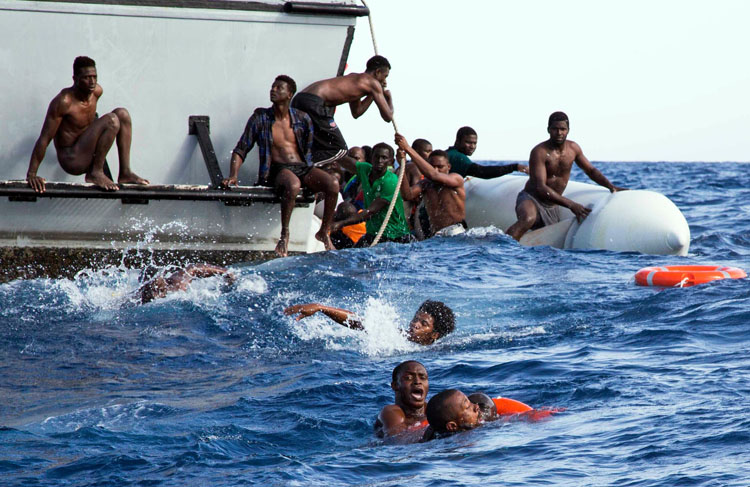
For the lucky ones, they live in near-poverty in Europe in shelters. Many become homeless and sleep on the street. Winter is a real ordeal. They have to cope with even worse living conditions than in their home countries. With constant fear, to be caught by the police and send back to their respective countries.
For God’s sake, even if you are poor, DO NOT LEAVE YOUR COUNTRY FOR AN ELDORADO THAT DOES NOT EXIST. Stay patient, God bless you whether you are in Africa or the West. Everything happens in its time. Do not be imprudent, as some people who go to the unknown straight to death or slavery. So out of love for God, tell your brothers and sisters to stay at home and wait for God’s time. Or to come legally to a country to finish school and find a job.


